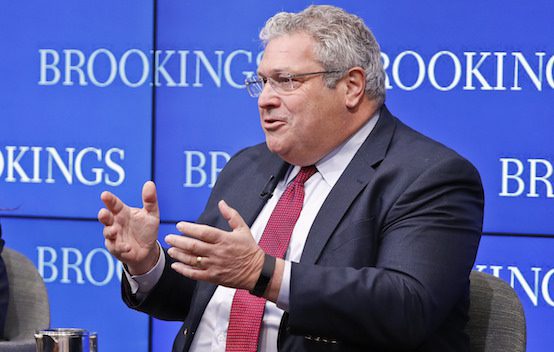Robert Kagan’s Cloudy Crystal Ball

Once labeled a neoconservative, Robert Kagan is actually a Friedmanite. Like Thomas Friedman of The New York Times, Kagan specializes in elegant oversimplification, regularly producing artfully constructed polemics that are superficially persuasive but substantively misleading. Taken seriously, they can even be dangerous.
Friedman describes himself as “a big believer in the idea of the super-story, the notion that we all carry around with us a big lens, a big framework, through which we look at the world.” Fastening onto some big framework enables Friedman, in his words, to “order events, and decide what is important and what is not.” Choose the correct—or most convenient—big framework and everything becomes clear. This describes Kagan’s approach as well, along with a tendency to deploy act-now-or-all-is-lost rhetoric.
Certain policy types have a particular susceptibility to super-stories that purport to explain everything. It liberates them from actually having to think. For those eager to remain au courant, it signals which way the herd is heading.
Prominent examples of this recurring phenomenon include George Kennan’s savvy marketing of “containment” as a basis of U.S. grand strategy at the outset of the Cold War and Francis Fukuyama’s impeccably timed revelation four decades later as the Cold War was winding down that history itself had ended.
Kagan’s latest entry into this field is an immensely long essay that recently appeared in The Washington Post. The title of that essay is “The Strongmen Strike Back.” While embroidering his argument with several thousand words of filler, Kagan helpfully states his thesis with a single compact sentence: “Today, authoritarianism has emerged as the greatest challenge facing the liberal democratic world—a profound ideological, as well as strategic, challenge.”
Put simply, the world is once more divided into two camps. It’s us vs. them, white hats against black hats, good besieged by evil, just like the old days.
Furthermore, Kagan charges, too many American conservatives are choosing to align with the wrong side. It is becoming increasingly difficult, he writes, to distinguish between conservative efforts “to protect political and cultural traditions,” on the one hand, and “the protection of white Christian cultural ascendancy” on the other. While stopping just shy of issuing a blanket indictment, Kagan contends that growing numbers of conservatives reject the principles enshrined in the Declaration of Independence and “find themselves in sympathy with the world’s staunchest anti-American leaders.” These include the oligarchs who presently govern Russia, China, Hungary, Venezuela, Turkey, Saudi Arabia, and Egypt, together comprising a de facto league of evildoers. Put simply, according to Kagan, conservatives—some? many? most?—are themselves anti-American.
Gazing into the crystal ball that served him so well when he endorsed preventive war to topple Saddam Hussein, Kagan writes that in the days to come “the binary distinction between liberal and non-liberal governments is going to be all that matters.” Furthermore, unless the camp of liberal democracies—necessarily led by the United States—set aside their differences to mount a great crusade to stem the authoritarian tide, evil will surely triumph.
Obstructing that crusade are American party-poopers who are “today insisting that we pull back from confronting the great authoritarian powers rising in Eurasia.” In other words, as is so often the case with Kagan, it’s the 1930s all over again. Once more, isolationists making common cause with the evildoers are mucking things up. For proof on that score, he writes, one need look no further than the actions of the Trump administration.
Kagan’s essay invites the following brief reflections.
First, please note that “The Strongmen Strike Back” dusts off and repackages a line of argument made by Kagan and other neoconservatives after 9/11 to promote a Global War on Terrorism. What we have here is bad whisky sporting a new label. Perhaps readers are not supposed to notice, but at least some will recall the disastrous consequences that ensued when Kagan last demanded concerted action to purge the world of evil.
Second, Kagan’s insistence on assigning a common label to the regimes of Vladimir Putin, Xi Jinping, Nicolas Maduro, Mohammed bin Salman, Abdel Fattah el-Sisi, et al‚—suggesting that they are devoted to a common cause and subscribe to a common worldview—is sheer nonsense. Contemporary authoritarianism does not derive from or express anything remotely like an ideology. Its origins are as disparate as its manifestations. It is not one thing, but many things.
Third, Kagan ignores Tip O’Neill’s famous adage that “all politics are local.” Kagan prefers to treat all politics as cosmic. Taking this approach makes it unnecessary to take into account local context and local history, not to mention previous ill-advised policies of the United States, which have contributed in no small measure to the dysfunction evident in places like Venezuela and Saudi Arabia.
Fourth, to say that the contemporary world is binary is as misleading as to describe the world of the 1950s and 1960s was bipolar. Such a false construct paves the way for all sorts of mischief. The starting point of wisdom is to acknowledge the multi-polarity of the international order.
Fifth, Kagan is simply off base in suggesting that the actions of the Trump administration somehow express contemporary conservatism. Trump himself is many things—narcissistic, impulsive, lazy, ill-informed—but he is not a conservative. As for his administration, the label that fits best is incoherent.
Few can match Robert Kagan’s talent for handing down weighty pronouncements that convey an appearance of insight and authority. Yet time and again, events have proven him wrong. With this latest essay, his record will remain intact.
Andrew J. Bacevich is The American Conservative’s writer-at-large.